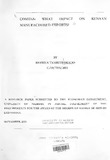| dc.description.abstract | The paper investigates what impact the COMESA regional integration agreement has had on the value of Kenyan manufactured exports. The study derives its inspiration from the lack of empirical evidence on the effects of regional groupings on Kenya's exports of manufactures and by extension on it's broader strategy of export led industrialization.
A gravity model of trade is employed. This is to control for the conventional determinants of bilateral trade, as well as to test for the specific impact of cOMESA. The paper focuses on the period since the signing of the cOMESA treaty and utilizes a panel of eight years to carry out the study. A fixed effects model is found to be preferred to a random effects model.
The major finding IS that COMESA does have a positive outcome on exports of manufactures, but this effect is not yet compelling. The estimates show that other variables, both included and not included in the regression, are more important.
The paper concludes by calling for a package of measures that could make COMES A playa bigger role in fulfilling Kenya's dream of Industrialization. | en |

